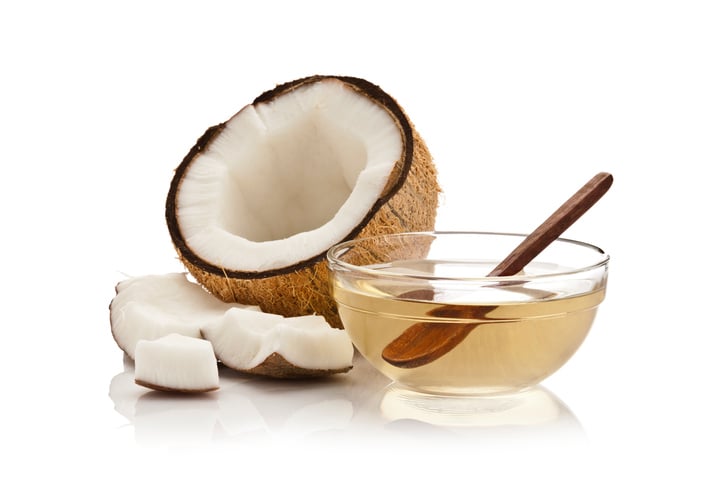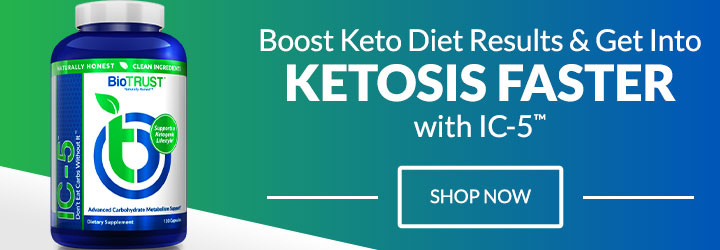Coconut Oil vs MCT Oil: What’s Better For You?

Coconut oil has been given a health halo and crowned a superfood in many circles. (In fairness, it has been criticized by others recently as well.) Folks are quick to spout off a list of potential benefits. Many that seem to come back to a key category of fat it contains called medium-chain triglycerides (MCTs). But the important question is…are the benefits of MCTs synonymous with coconut oil? Let’s take a look at the battle of Coconut Oil vs MCT Oil!
Food Faceoff: Coconut Oil vs MCT Oil
MCTs are fats with 6 – 10 carbons. And caprylic acid (C8) and capric acid (C10) are the two most prominently featured MCTs. (Hexanoic acid, C6, is the other MCT, which is also garnering attention.) The main foods you can find MCTs in are coconut oil, palm kernel oil, butter, milk, yogurt, and cheese.
Despite falling under the umbrella of saturated fats, MCTs are considered to be “functional” fats by many in the scientific community due to the array of potential health benefits they offer.1 In fact, researchers have suggested that “distinction should be made regarding chain length when it comes to discussing the effects of saturated fats.”2 In other words, not all fats are created equal.
And when it comes to MCTs, they may offer several distinct metabolic advantages, such as:
- Increased energy levels. Unlike long-chain triglycerides (LCTs), which contain 12 or more carbons and are the types of fats more commonly found in foods, MCTs are easily digested and rapidly absorbed. They are transported directly to the liver and are quickly and efficiently burned for energy. Plus, they are unlikely to be stored as fat.
- Increased ketone bodies. MCTs, particularly C8, are known to have a high “ketogenicity,” which means they are readily converted to ketone bodies.3 This distinct property, which is particularly unique to MCTs, may offer several advantages and health benefits, some of which will be discussed below. For more on the topic, take a look at some of the resources we have on the ketogenic diet.
- Enhanced focus and cognitive function. Among the benefits of ketones is that they serve as a key energy source for the brain. Along those lines, ketones may be beneficial to folks looking to support brain health and enhance cognitive function.4 For instance, one study showed that supplementation with MCTs led to rapid increases in ketones and, subsequently, improvements in tests of cognitive function and memory.5
- A boost in metabolic rate. Compared to long-chain fats (12 carbons or more), MCTs have been shown to increase metabolic rate and total daily caloric expenditure.6,7 One study found consuming 1 – 2 tablespoons daily of MCTs can elevate the metabolism by as much as 5%. This may mean burning an additional 150 calories or more per day.8
- Reduced appetite and cravings. Several studies have shown that MCTs may increase satiety, reduce appetite, and decrease total caloric intake.9,10 As mentioned above, MCTs are readily converted to ketone bodies, which are thought to have a direct appetite-suppressing effect.11
- Reduced body fat. Considering that MCTs may manipulate both ends of the energy-balance equation (increased metabolic rate and reduced food intake), it’s not surprising that supplementing with MCTs can enhance weight loss and help decrease belly fat (more than other types of fats).12–14
From a research standpoint, MCT oils often contain a combination of C8 and C10, with amounts ranging from 37 – 55% and 30 – 45%, respectively. In other words, the total MCT concentration is somewhere in the neighborhood of 67 – 100%. If you’re interested in reaping the benefits of MCTs, a good range to aim for is around 18 – 24 grams per day.8
Coconut oil is often lauded for its MCT content. And certainly, coconut oil is among the best dietary sources of these unique functional fats. However, the MCTs C8 and C10 only make up about 13 – 15% of the fat in coconut oil (with a slightly higher amount of C8).15,16 For what it’s worth, about 7 – 9% of the fat in butter comes from these very same MCTs.
In reality, about 50% of the fat in coconut oil is lauric acid (C12). While lauric acid is sometimes classified as a MCT, as mentioned above, it’s the combination of caprylic and capric acid that seem to responsible for the majority of often-touted benefits associated with MCTs. In other words, coconut oil is not synonymous with MCTs (even though commercially available MCT oils and powders are typically made from coconut and/or palm oils).
So, it’s not accurate to extrapolate the potential benefits of the coconut oil vs MCT oil. For example, to get the metabolism-boosting benefits of MCTs from coconut oil, you’d probably have to consume about 8 tablespoons of coconut oil. Obviously, the sheer number of calories would more than cancel out any potential benefits.
But let’s not throw the baby out with the bathwater. There are other benefits to lauric acid and coconut oil, in general.
- For starters, there is some evidence to suggest that including a moderate amount of coconut oil can promote weight management. For example, a group of Brazilian researchers found women who consumed two tablespoons of coconut oil per day for 12 weeks while following a reduced-calorie diet and daily exercise lost significantly more belly fat than the placebo group (i.e., diet and exercise alone).17
- Research shows that lauric acid increases HDL cholesterol to a greater extent than LDL, resulting in a more favorable cholesterol profile.18
- Additionally, lauric acid has powerful antimicrobial (e.g., antibacterial, antifungal, antiviral) properties.19,20 So, it can help kill off pathogenic bacteria, fungi (e.g., yeasts), and viruses.
- Interestingly, lauric acid can help prevent tooth decay and plaque buildup. It’s not uncommon for people to rinse their mouths with coconut oil (a practice known as oil pulling).18
- Thanks in large part to lauric acid (which is a saturated fat that is quite stable when exposed to heat), coconut oil a great choice for cooking (but not at high heats, such as deep-frying).
- And there’s more to coconut oil than fat. Virgin coconut oil is also a rich source of antioxidants, including the phenolic acids p-Coumaric cid, ferulic acid, caffeic acid, and catechin, which are recognized for their ability to scavenge free radicals and protect against oxidative stress.21
- Virgin coconut oil has substantially better antioxidant capacity than refined coconut oil, which is bleached and deodorized.21 What’s more, virgin coconut oil is significantly higher than refined coconut oil in polyphenols.
Take-Home Points: Coconut Oil vs MCT Oil
- In the Coconut Oil vs MCT Oil faceoff, both offer potential health benefits.
- However, the reported health benefits of MCT oil—such as increased metabolic rate, reduced appetite, improved body composition, and increased levels of ketone bodies—can NOT necessarily be transferred to coconut oil. In other words, coconut oil may not be the superfood some claim it to be.
- Although coconut oil has come under some scrutiny lately, it may offer certain health benefits. And it can certainly be included as part of an overall healthy diet based predominantly on whole, minimally processed foods.
- If you choose to use MCT oil, which can also be found in powder form, look for one that contains as least as much, if not more, C8 (compared to C10).
- If you choose to use coconut oil, it’s best to go with virgin coconut, which is higher in antioxidants (and coconut flavor).
Supercharge Your Diet Results with IC-5
IC-5, which is scientifically-designed to promote insulin sensitivity and improved carb tolerance, is one of our top diet-boosting supplement.
With IC-5, you know that you are supporting carbohydrate tolerance, keeping potentially harmful AGEs at bay, and amplifying the anti-aging effects of the ketogenic diet. It’s a triple threat for overall health and anti-aging!






